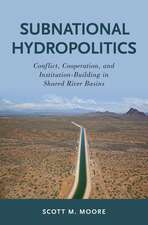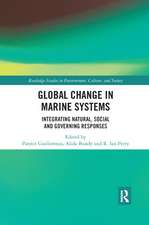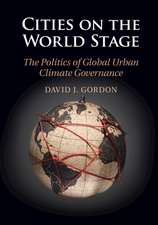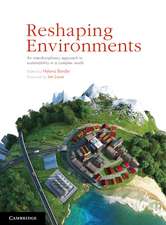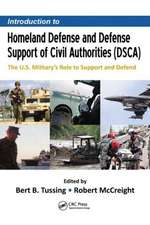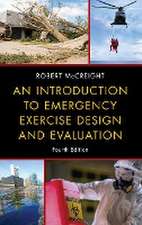Introduction to Emergency Exercise Design and Evaluation
Autor Robert McCreighten Limba Engleză Hardback – 29 noi 2016
Preț: 673.73 lei
Preț vechi: 874.98 lei
-23% Nou
Puncte Express: 1011
Preț estimativ în valută:
128.92€ • 140.47$ • 108.63£
128.92€ • 140.47$ • 108.63£
Carte tipărită la comandă
Livrare economică 23 aprilie-07 mai
Preluare comenzi: 021 569.72.76
Specificații
ISBN-13: 9781598888928
ISBN-10: 1598888927
Pagini: 175
Dimensiuni: 152 x 229 x 18 mm
Greutate: 0.5 kg
Editura: Rowman & Littlefield
ISBN-10: 1598888927
Pagini: 175
Dimensiuni: 152 x 229 x 18 mm
Greutate: 0.5 kg
Editura: Rowman & Littlefield
Cuprins
Contents
Special Introduction
Preface
About the Author
1 Emergency Exercises: Objectives & Purpose
2 Essential Exercise Design Elements & Steps
3 Issues in Exercise Design
4 Exercise Organization & Structure
5 Exercise Control & Management
6 Exercise Evaluation Principles
7 Exercise Evaluation Issues
8 Useful Considerations in Exercise Planning
9 Summing It Up
Appendices
Appendix A: Glossary
Appendix B: Evaluation Guides
Appendix C: MSEL Sample
Appendix D: Tackling Tabletop Exercises
Appendix E: Useful Resources
Appendix F: Information Sharing & Message Management
Notă biografică
After serving the United States government at the State Department and other federal agencies over a 35 year career, Dr. McCreight retired in 2004 and served as a consultant for major homeland security and national defense contractors. His professional career includes work as an intelligence analyst. treaty negotiator, arms control delegate to the UN, counter-terrorism advisor, political-military affairs analyst and Deputy Director of Global Scientific Exchanges at State Department. During his service at State Department he was a senior Soviet military analyst with INR and specialized in the assessment of nuclear, chemical and biological weapons programs. Later in his professional career he performed assignments where he either managed or coordinated international post-disaster relief and humanitarian operations, developed peacekeeping policy, promoted global science and technology cooperation projects and helped design treaty verification systems. At the middle of his career he also participated in the design and coordination of White House nuclear readiness command crisis exercises during the Reagan administration. During his federal career he designed, developed and coordinated well over 26 cabinet level strategic nuclear preparedness exercises, worked on Presidential Protection and Survivability Programs and directed the operation of several dozen senior-level military exercises involving theoretical force-on-force scenarios between the United States and the Soviet Union. This followed several years of designing and evaluating unit combat exercises for the U.S. Army. McCreight spent 27 years of combined active and reserve military service concurrently with his civilian work in U.S. Army Special Operations and has devoted 15 years to teaching graduate school as an adjunct at Georgetown, George Mason, George Washington, and Virginia Tech Universities in subjects as diverse as disaster and emergency management, strategic intelligence, nonproliferation policy, homeland security policies, terrorism analysis, intelligence analysis, scientific issues and defense policy and assessing WMD threats. He completed his doctoral degree in Public Administration in 1989 and remains active in graduate education programs in emergency and crisis management as well as security studies and terrorism analysis. He has also written and published over 29 articles on chemical weapons use, disaster management, disaster recovery, post-strike attribution, biological weapons threats to homeland security, crisis management, WMD scenario development and collegiate educational strategies for developing future crisis managers for government service. His first edition of this textbook-Emergency Exercise Design and Evaluation was published in 2011 and became a popular resource in both undergraduate and graduate schools. He has co-edited and authored a new textbook on Homeland Defense published by CRC Press in October 2014.


